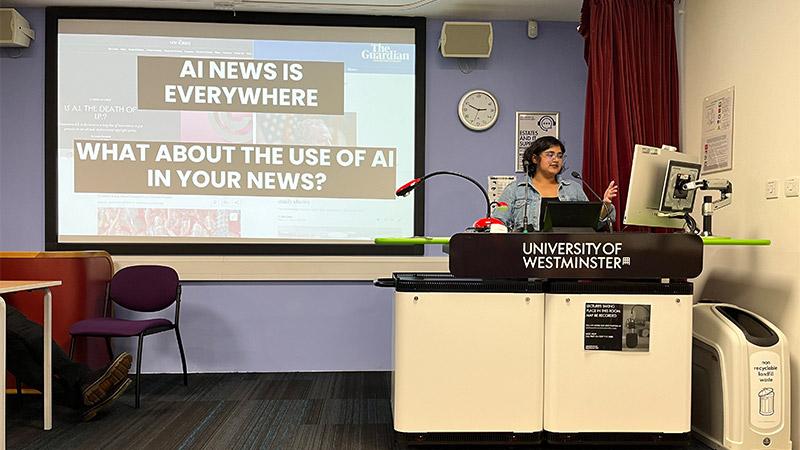Westminster hosted its annual Graduate School Festival from 3-7 June 2024 showcasing the research, creativity and ambition of the University’s community of doctoral researchers.

This year’s Graduate School Festival theme was Connections, Reflections, Intersections, which brings together student-led workshops for the first time, as well as lectures, the 3 Minute Thesis (3MT) competition and a symposium presenting doctoral research across the University of Westminster. Students, colleagues and external guests got the opportunity to connect with many doctoral researchers in the University.
The festival kicked off with a grand opening reception at the Marylebone Campus, which hosted a showing of Gothic Opera, a work in progress by Howard Lukk, a PhD researcher based at the Centre for Research and Education in Arts and Media (CREAM) at the University of Westminster. Howard pushed the boundaries of the traditional art forms of storytelling by showcasing a short silent film in which the narrative is only told through song, dance and moving images.
The week-long series of events also brought back some old favourites such as the Thinking of Doing a PhD? panel, a keynote lecture on co-designing tropical rainforest conservation technologies with rural forest-fringe communities, delivered by Joycelyn Longdon, a doctoral researcher at the University of Cambridge, as well as the 3 Minute Thesis (3MT) competition.
Founded by the University of Queensland in Australia, 3MT is an academic research communication competition that offers doctoral researchers an opportunity to communicate the significance of their research to audiences beyond their field and colleagues in just three minutes, using only one slide and no notes. This year, 3MT was hosted by Dr Naomi Paxton and judged by Catherine Loveday, Luke Robert Mason and Caroline Watkinson, who collectively announced the winner of the competition, Ifigenia Kalampouka, a keen PhD researcher in Quantum Biology based in the School of Life Sciences who explores the interaction between light and biological systems, the field of Photobiomodulation as well as light emitted from biological organisms for communication. She also won the People’s Choice vote and will now be entered into the national Vitae 3MT competition, which will be broadcast in October 2024.
Ifigenia said: “Participating in the 3MT competition at Westminster was truly inspiring. It challenged me to explain my research simply in just three minutes and communicate its importance clearly and concisely. What really inspires me about my research is its potential to make a meaningful impact. The competition not only honed my communication skills but also allowed me to connect with other brilliant researchers across various disciplines. Winning both the People’s Vote and the Judges' Vote was incredibly humbling and motivating. It reinforced the significance of my work and the importance of making complex research accessible to a broader audience. I'm grateful for this experience and the support from our amazing coaches and the Westminster community.”
Doctoral researchers from throughout the University came together for a symposium called Researchers in Conversation on the last day. Doctoral researchers were placed in pairs, and each gave a brief presentation about their work followed by a conversation and audience Question and Answer (Q&A). Each doctorate researcher gave a brief presentation about their work, which was followed by a discussion. This symposium successfully investigated the common interests and themes that emerge from the presentations of scholars from various schools by bringing them together in conversation.
The podcast series titled Doctoral Dialogues also made its comeback for this year’s Graduate School Festival. Hosted by Megan Carnrite, a PhD researcher at CREAM at Westminster, this podcast features pre-recorded conversations between doctoral researchers based across the University.
This event directly contributes to the United Nations Sustainable Development Goal (SDG) 4: Quality Education. Since 2019, the University of Westminster has used the SDGs holistically to frame strategic decisions to help students and colleagues fulfil their potential and contribute to a more sustainable, equitable and healthier society.
Find out more about Westminster’s Graduate School and previous Graduate School Festivals.








